#and technically both are doomed by the narrative too
Explore tagged Tumblr posts
Text

Green eyes, Troubled lives
#fanart#myart#fnaf#five nights at freddy's#vanessa fnaf#Monika DDLC#doki doki literature club#ddlc monika#fnaf vanessa#security breach#fnaf security breach#fnaf sb#crossover#it’s not about who had it worse#they both suffered a lot#and technically both are doomed by the narrative too#you bet your ass these women are not mentally stable#they’re so damn desperate#like come on gals you need therapy both of you#just don’t delete or unalive your therapists please
21 notes
·
View notes
Text
Ngl. I’m sort of glad I’m currently hyperfixated about Project Sekai.
Especially from what I’ve been hearing and seeing from glimpses about the jjk manga atm. I can tell the fandom discord would be chaotic!
Would the fandom be as toxic as it was during the Gojo vs Sukuna fight?
Dunno. ¯\_(ツ)_/¯
And like, it doesn’t matter to me anyway since I’m over here kicking my legs excitedly about all my favs within Project Sekai~ :3c
Besidessss. I do need that optimism in my life atm~ ;v;
#like one of the main themes within Project Sekai is to thrive to be better#both in a technical sense but mainly in an emotional and personal sense#where all the characters grow and be better and happier#and while I still hope for jjk to end on a positive note!#there’s definitely a lot of tragedy and doomed narratives within jjk#which is like! it’s good! and great! but it’s just not something I’m in a mood for atm. ya feel me?#and like Project Sekai also dives into more serious topics too!#it’s just have a more positive message and outlook is all#hyperfixations#random thoughts#my txt#project sekai#pjsk#jujutsu kaisen#jjk#txt post#fandom#jjk 261#jjk leaks
6 notes
·
View notes
Text
Jayvik & Timebomb Parallels, AKA, why isn't anyone talking how Viktor and Ekko mirror each other in Arcane??
I'm surprised I haven't seen more comparisons between Ekko and Viktor, not to mention how those parallels between the characters also create parallels between the Ekko/Jinx and Viktor/Jayce relationships, which I'm gonna argue here are both romantic relationships.
1 ) Both Viktor and Ekko see it as a personal cause to make life better for people in the undercity, to the point of both becoming a local leaders focused on creating a place of peace where Zaunites can retreat to in times of peril.
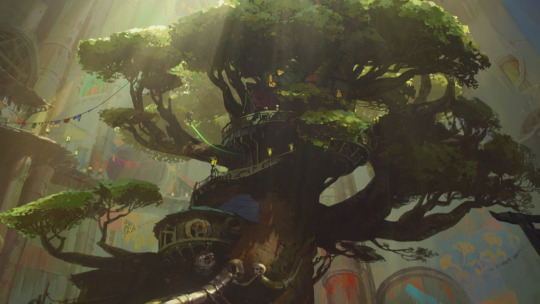
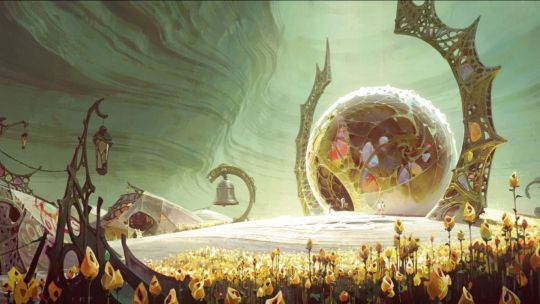
Indeed, from a narrative perspective, I would argue that one Doylist reason Ekko needed to go into the Anomaly in Act 2-3 is to make space on the scene in Zaun for the rise of Cult Leader Viktor.
If Ekko had been around, he would have either served as a roadblock to Viktor's rise out of a general sense of distrust, I imagine, or he might have easily become a supporter, or maybe even a cult follower of Viktor's if he admired and believed in the vision, which would of course doom the world.
(This further illustrating just how narrowly Jayce, Wizard Viktor, and Ekkko had to thread the needle on defeating the Machine Herald in the final act, since I would argue Ekko like Jayce remaining in the canon universe for the months of Cult Leader Viktor's rise would also have led to Ekko and Jayce's defeat or assimilation before the final act had either stayed.)
2 ) Both Viktor and Ekko are, of course, genius undercity scientists who are able to grasp quickly concepts like wild runes and the Anomaly. But it's their partner's actions that bring Hexgems into their life. Powder by causing the explosion where he gets the shards from, Jayce of course by creating Hexgems in the first place.
3 ) Both are Heimerdinger's close assistant and pupil before they meet their true scientific partner in Jinx/Powder and Jayce.
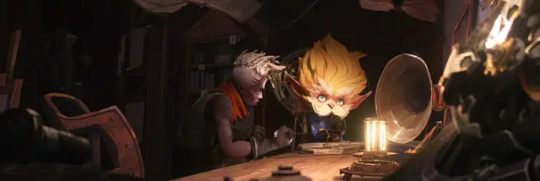
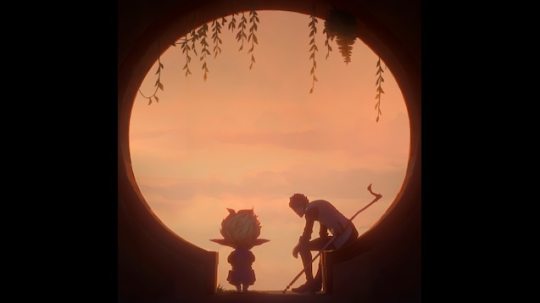
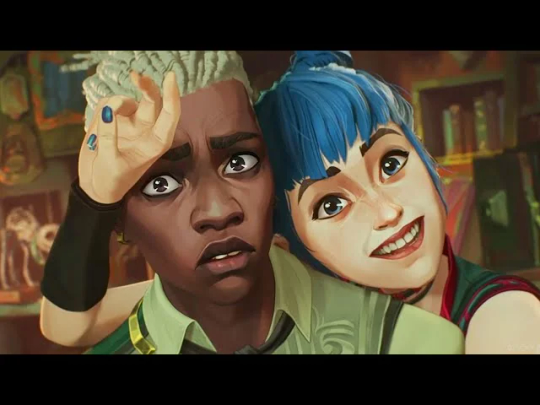

4 ) Aaand, this is where it gets gut-wrenching, because both Ekko and Viktor have to say goodbye to the alternate universe version of the person they love and this is where it gets wild because they make the same face while doing so. And their loved one, Jayce and Powder, make the same face back of startling when they realize they're looking at an alternate version of the person they love.
(Source here if you want to watch the full videos side by side because it's NUTS how similar the faces Viktor/Ekko and Jayce/Powder make to their alternate universe loves: https://x.com/yearnerjayce/status/1863132466346656031)
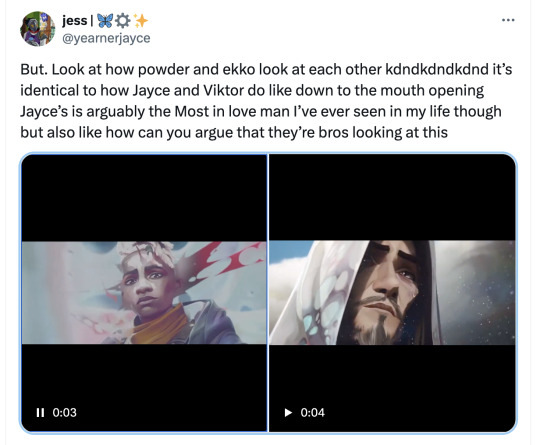
In the blocking of the scene, they've even both got a version of one half of that universe's part of the relationship lying between the two of them (Powder holding her version of Ekko, while the Hexcorized version of Jayce lies between Wizard Viktor and canon Jayce), so the blocking is visually very similar too in a clear romantic parallel that is mind-boggling.
By the way, these moments are also technically happening in the same episode as far as romantic parallels go, we just don't learn about this parallel on Viktor/Jayce's side until the final episode with the full reveal.
And of course, both future Viktor and canon universe Ekko must make the ultimate sacrifice of losing access to an alternate version of the person they love who is happy and healthy (instead of, well, Jinx, and/or dead in the case of Hexcorized Jayce), in order to save the world.
By the way, there is a parallel that stretches throughout the whole 2.07 alternate universe episode, with the heavy implication that Ekko and Powder are this world's Viktor and Jayce. They're even doing an Innovators Competition. In both universes, Hextech is explored through the loving partnership of a pair of young scientists.
5 ) Finally, both Viktor and Ekko stop their loved one from committing suicide. Interestingly, both Jayce and Jinx attempt to do so in a way that's related to Hextech, with Jinx using Hexgems in her grenade, and Jayce getting cut off from Hextech being the reason he's seeking to end his own life. They also, coincidentally or not so coincidentally, attempt to do so in a way that's related to falling from a height.
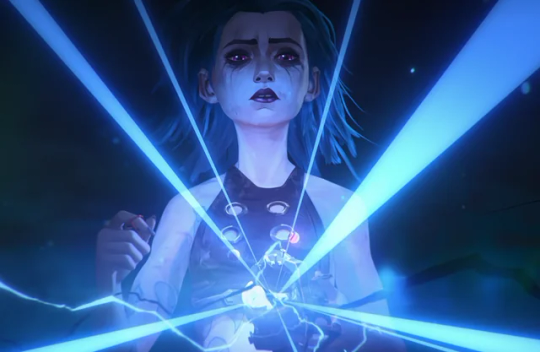
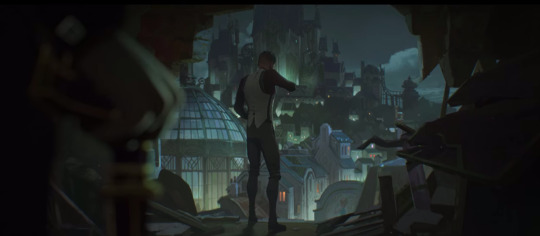
Both are interrupted by someone they're not too happy to see at first, but who goes on to be their partner. Even Jinx/Ekko get one last partnership in the final Act, which is an interesting mirror to Jayce/Viktor, whose suicide attempt -> partnership helps launch the action of the whole series in the first Act of the first season, making these two couples in a way, mirrors bookending the series.
#jayvik#timebomb#arcane#arcane meta#jinx arcane#powder arcane#jayce talis#viktor arcane#wizard viktor
653 notes
·
View notes
Note
Hello! Wanted to say that I’ve really enjoyed your analysis on Aventurine’s theming - and yea big agree that part of the charm of the guy is that he’s a weird paradox (he got everything one should technically want, and he also lost absolutely everything he cares about) - and also I like your comment that he is, as a character, actually pretty obnoxious (it’s an odd character charm point to me)
Also your post on the way he interacts with the ladies in the cast kinda reminded me - I know folks tend to focus in Ratio’s note but I ended up zoning in on his convo with Acheron more than anything else - because a lot of Penacony is Aven butting heads with other aeon-touched people (Acheron, Sunday) - but Acheron seems like a fun foil because she also has a pretty double-edged metaphysical blessing that is associated with losing everything she loved, but she ironically hasn’t given in to full meaninglessness.
I think one of Aventurine's defining character traits is that he "tests" everyone he encounters to judge whether they are trustworthy or whether they are a danger to him (I guarantee you, he has some kind of mental ranking scale for how likely people are to dislike or mistreat him), and I think his being obnoxious is actually a direct offshoot of this.
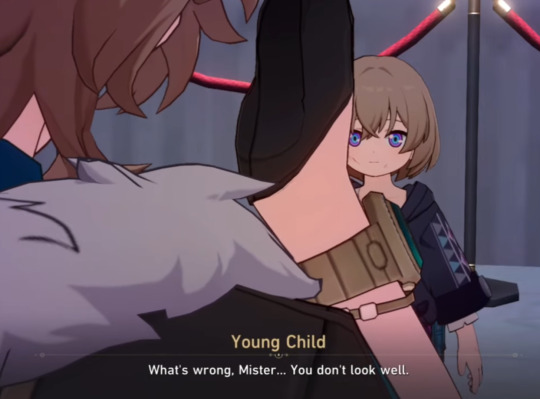
Kakavasha clearly was raised with manners; he knows how to be polite and to tone down his responses to social situations as appropriate, which means that, in every other scenario, he is actively choosing to be obnoxious, even in situations where it seemingly won't benefit him (like talking back to the slave master or being too forward when first meeting Sunday, for example) because it allows him to gauge exactly how others feel about him and exactly how much they will let him get away with.
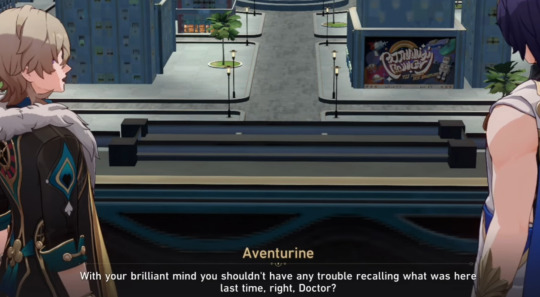
People who play along are potential allies (Robin, the Trailblazer) and people who act grumpy but actually tolerate the obnoxiousness are safe (Ratio, Sparkle, most of the rest of the Express Crew), while people who respond poorly (Sunday, basically everyone else Aventurine dealt with in the past, etc.) are forced into showing their true colors. If minor obnoxious behaviors can provoke them, then it means their core response to Aventurine is likely to be one of dislike and disrespect. He's just forcing that response from them out into the light sooner, rather than later, by being obnoxious from the get-go.
(And, to a certain extent, I think he also just finds it fun to be a bit obnoxious. Like, he's free to say and do whatever he wants now--who is going to stop him from being a brat if that's what he feels like doing?)
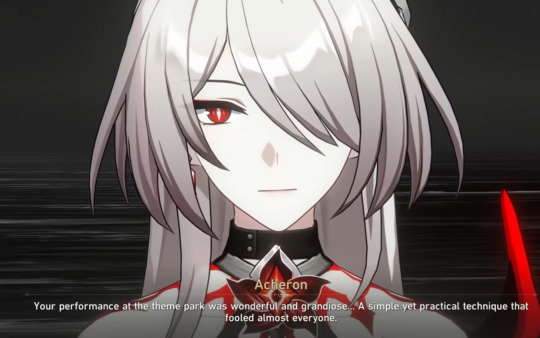
But on to Acheron... Yes, I do think there are a lot of parallels between Acheron and Aventurine (came from a doomed people, lost everyone, both determined to hold out against nihility and live just for the sake of living, "blessed" by aeons), but I think narratively speaking, the story puts Acheron in a different position when her tale entangles with Aventurine's: the surrogate big sister role.
Acheron's a very good parallel to Aventurine's sister in numerous ways: First, she essentially sacrificed herself to defeat the evil threatening her people, but is ultimately unsuccessful, resulting in the permanent loss of all she knew.
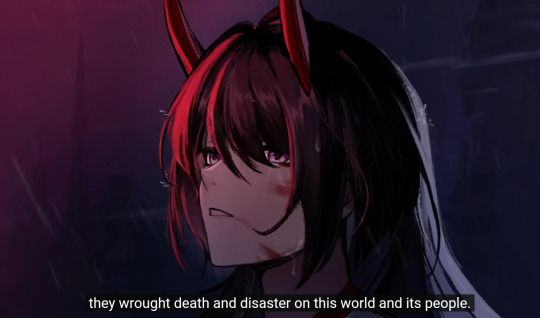
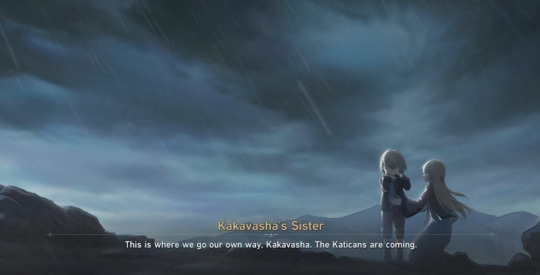
This loss also resulted in Aventurine's sister actually dying, while Raiden Mei experienced a symbolic death, taking on the name "Acheron" to evoke the Underworld, getting a ghostly, bleached white form, and prowling the river of nihility like a wandering spirit of the dead.
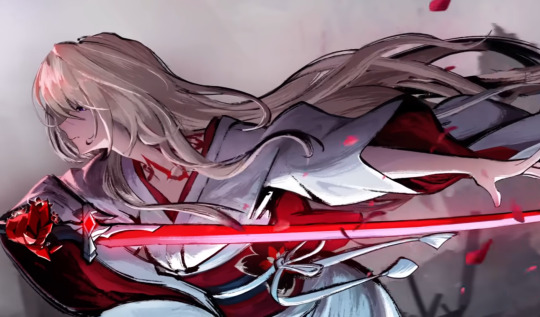
Second, the philosophy Acheron espouses is nearly identical to Aventurine's sister. When even as a child Kakavasha was doubting the value and meaning of life, his sister was the one constantly reaffirming that life has meaning, despite its hardships, and that continuing to exist is the way to honor those who have sacrificed for you. Just as Aventurine's sister expresses that people must hold on to faith, Acheron reminds everyone she encounters to cling to the last bit of color and light in their lives.
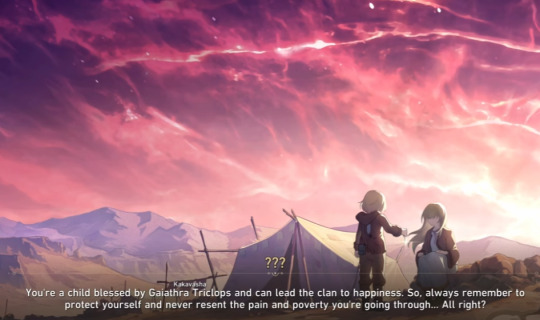
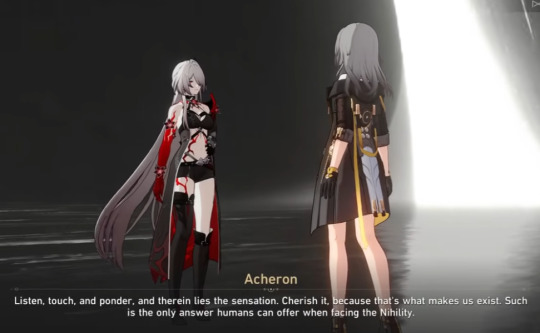
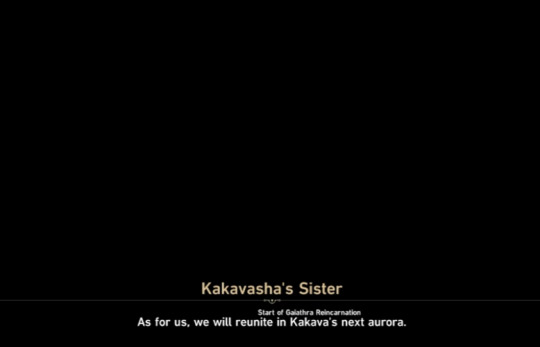
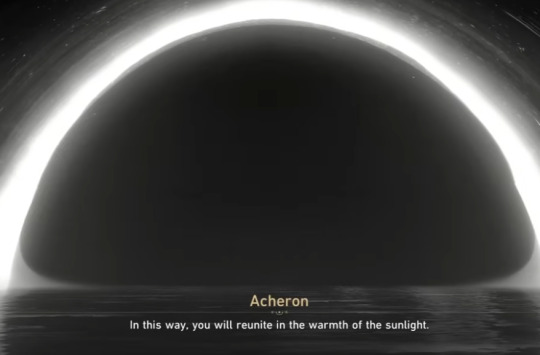
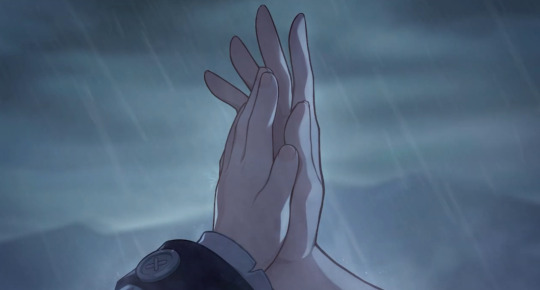
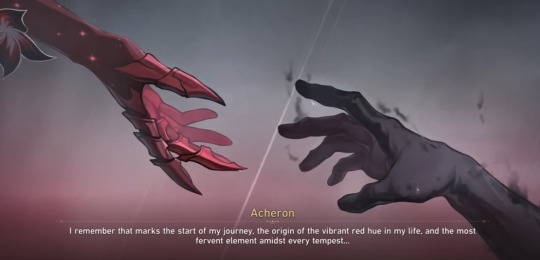
This ends up being echoed by the role of guidance that she plays for Aventurine, with him both directly relying on her for his continued survival:
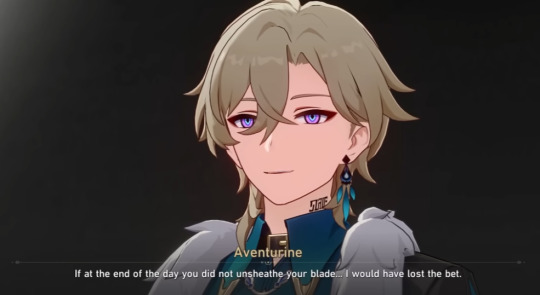
And turning to her in his moment of greatest emotional need:
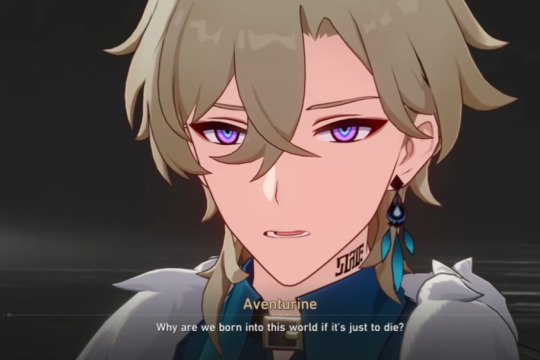
(Sound familiar? It should. This is the exact same question Kakavasha once asked his sister.)
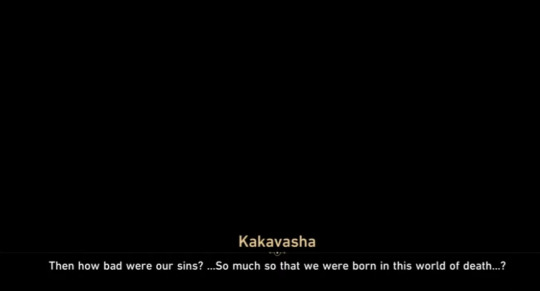
But there's also a very, very nice visual parallel that goes on with Acheron and Aventurine's sister: the dusk rain that accompanies her.
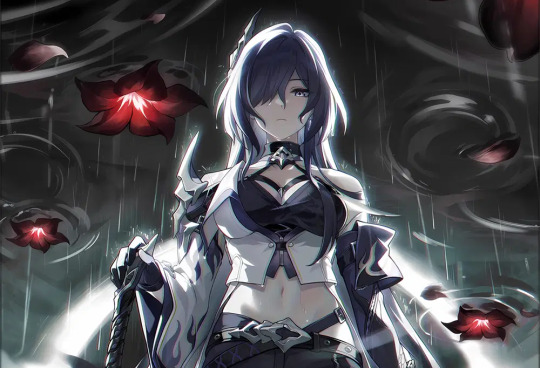
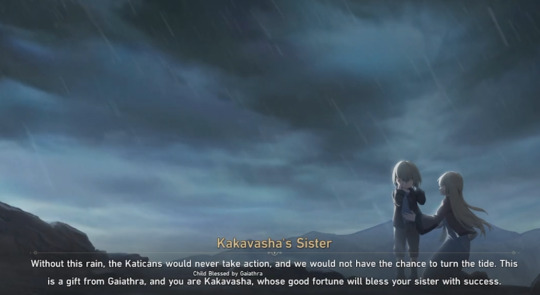
For Aventurine, the rain has complicated emotional connotations. For the Avgin, it was desperately needed, life-giving water, and thus was considered a direct blessing from Gaiathra. Rain on Aventurine's birthday was the sign of his being favored by the aeon, and yet it also rained on the day he lost everything and had to flee from the only home he had ever known (conveniently also his birthday, dude this guy's life sucks).
Meanwhile, the rain for Acheron is equally complex--rain can bring life, the renewal of barren, lifeless lands... But we also see the rain accompany Acheron through her worst loss, the final collapse of her planet:
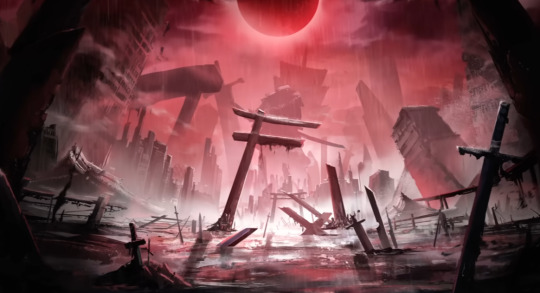
It also is said to rain constantly within the shadow of nihility, a lightless gray that washes away all that people wish to cling to.

For both Acheron and Aventurine's sister, the rain accompanies the end of their "lives," the backdrop to their ultimate sacrifices.
Yet it is also in the rain that they both send Aventurine onward, escaping from the cage of his destiny into a "better" life. From beneath the shadow of the storm, they both bid him to go and not turn back, freeing him and permanently changing the course of his life.
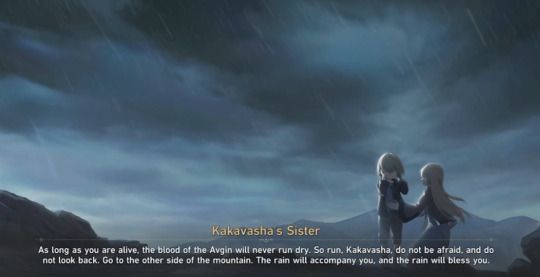
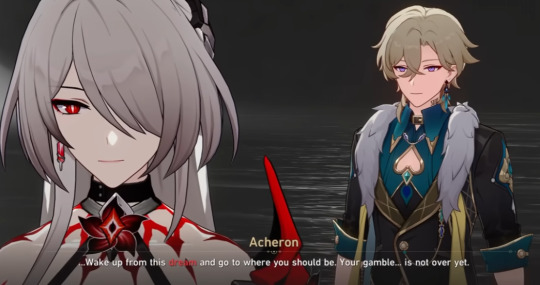
The rain that took everything from both Aventurine's sister and Acheron is ultimately what saves him.
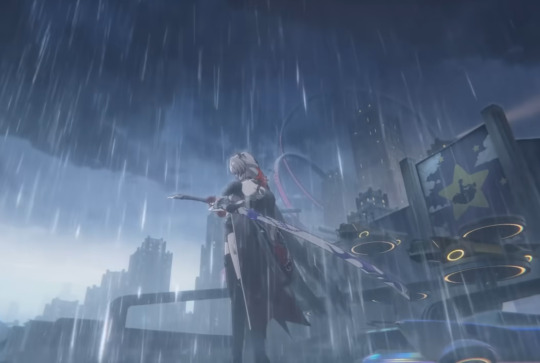
It's all a very tidy and well-written parallel.
#honkai star rail#aventurine#acheron#aventurine's sister#character analysis#character parallels#hey look I'm back!!#I only mildly died from IRL stress for a bit there#still working on the backlog of messages#also I feel like this is bad thing to admit after making a whole post#about how Acheron is a parallel to Aventurine's sister#but Acheron is lowkey my “If I had to ship Aventurine with a woman”#I'm sorry to the Aventurine and Topaz crew but I can't#this is just side rambling in the tags now#Acheron is best girl#just sayin
214 notes
·
View notes
Note
Will your nightwatch au have any reimagining of how determination works, especially when it’s mixed with positivity, negativity, or void? Does it invert negativity/positivity by creating hope in despair and discontentment in happiness? Is it a force that resists the will of the creators/narrative (pro free will) or enforces it (anti free will)? If determination is amplified by the presence of negativity in order to ensure survival, can a determined character with negativity-based powers (not to assume what other ship kids may appear in the au or anything) with enough negativity going through their system doom spiral until the determination is tearing them apart at the seams?
(I have uh, been thinking about the logistics of this since mid 2018 don’t mind me)
Yes kinda - I’ll explain rn I medicalize a lot of concepts. I’ll also explain it inside the comic but here’s some minor stuff:
The main medical condition I focus on is “corruption”
In nightwatch, monsters bodies are incredibly vulnerable to foreign code. The most common example of this is getting sick, a monster absorbs a small viral bit of code, their body is overwhelmed and get symptoms of sickness, and eventually their body deals with the minor illness and everything is fine. But sometimes code changes can be too potent for a monster, creating chronic and sometimes terminal syndromes. This is what is called corruption.
Here are the three known corruptions (they are umbrella diagnoses)
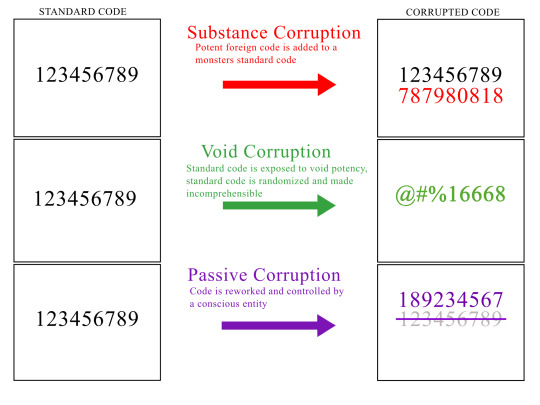
Substance corruption:
substance corruption is the most common, (think nightmare and geno)
A potent substance that shouldn’t be within a monster gets in a monster and overwhelms their code permanently. This is a big category holding many different syndromes but the one thing in common is their physical form literally breaking down.
Some examples could be monsters having human soul substance injected into them, wether it be kindness or determination their bodies will be corroded slowly from the overwhelming code substance. Nightmare eating the apples count too, it’s code being too potent and quickly destroying his entire body.
This can be slowed down with treatment, reversion therapy is one but substance blockers are an alternative.
Void corruption:
Void corruption is rare, (think error, blue error, or fatal error)
When a entity is exposed to the Voids for too long, they may go through a slow process of void corruption. starting with sickness, then symptoms of confusion and amnesia, and lastly physical changes. The most identifiable trait is their final physical appearance, changes in color, additional limbs, open code numbers on anatomy, and glitching.
Their code gets randomized, new traits are gained and old traits are lost. Chronic pain, paranoia, hallucinations, delusional obsessions, and emotional instability are all caused by the distortion of their mind (and isolation of the void)
Treatment is difficult as a majority of patients show hostility to medical intervention. However reversion therapy is theorized to be affective for treating the patients.
Passive corruption:
Passive corruption is less common then substance but more common then void (think cross and killer)
When a conscious entity purposely changes another’s code. The victim goes through periods where they loose autonomy to the entity’s influence. The symptoms vary because it’s up to the foreign entity’s desire but it’s possible to see a change in voice, physical appearance, mental stability, and magical capabilities within the victim. The most well known example in the fandom is overwriting someone, but killer being controlled and reworked by the player is also passive corruption.
Reversion therapy and substance blockers work affectively as treatment.
Additional notes:
A monster can inhibit more then one category. For example, killer while gaining the substance of determination through passive corruption, would technically have both substance corruption and passive corruption.
This is a huge concept in nightwatch. There’s many additional elements like the specific affects of human soul substance, but i fear that would be too much of a rant from me.
Human traits are a medical thing in nightwatch, monsters cannot naturally have human substance, but can gain it through corruption. It’s not a trait of personality or belief or emotion.
It would be difficult to quantify and explain how human traits connect with feelings even within humans themselves, all systems I’ve seen do that don’t really make sense to me (cough glitchtale) so I made it a medical thingy. I’m not too sure if this is the answer you wanted but I tried.
163 notes
·
View notes
Text
I feel like the need to make Patroclus a demigod stems from a lot of tsoa fans ( & haters ) needing a reason to make Patroclus and Achilles equal and they think making Patroclus a demigod will accomplish that.
But Patroclus and Achilles already are equals. They have strengths where the other has weaknesses. They may not be physically on the same level but that’s kind of the whole point. Achilles was always going to be stronger and a better fighter than everyone else. That was always going to happen. But when we look at the way Patroclus and Achilles interact in the Iliad it is clear that Achilles holds Patroclus to a high regard, continually mentioning how much Patroclus not only means to him but just how much respect Patroclus receives from everyone in general. They’re literally the Greatest of the Greeks and the Best of the Myrmidons because of how good they are. Theres no need to make Patroclus a demigod. It changes too much of his character and kind of mutes what made him so good. He spoke to Achilles as an equal when they argued. He wasn’t as strong as Achilles but he still went out with achilles armor. He wasn’t untouchable and god like but he was kind and genuine. He was an exile, with no birthright, no claim to anything, and yet the entire army mourned hen he died. Patroclus was so very utterly humane in both good and bad ways throughout the war. He was stubborn and bloodthirsty when he fought, riding some high from the war that many other soldiers probably got. He got cocky, and paid for it. But he was also a voice of reason. He didn’t want to see his men dying, not when they did not have to. He was a mortal man through and through, the good and the bad, until the end. I don’t see why you would want to take that away from him to add some meaningless power up.
And on the flip side, Achilles being a demigod is also integral to his story because he’s supposed to represent the divide between human and god. It’s such an important moment when Patroclus is killed because it’s as if Achilles’ mortal side had been killed with him, leaving only rage typically reserved for gods. Achilles during he beginning of the war is untouchable, but he is also respectful. He sacks the cities but he honors the fallen. He takes the war prizes but he calls out Agamemnon for not giving back chryseis even though men ( HIS men too ) are dying. When Achilles refuses the embassy he also essentially rejecting his mortality. He doesn’t WANT to fight in this war in which he will die for a man that dishonored him. And he’s technically not wrong to do so. But when he starts wishing for his comrades to die so that they will beg him to come back, appeasing his lost pride, he has begun to slip over into his divinity, embracing it shamelessly and disregarding the lives of others as long as he gets what he wants. As gods tend to do. And even if he doesn’t get that, he didn’t care about his comrades dying as long as he and his men could sail home. Achilles’ mortality slowly trickles out of him until it is violently lurched out and killed when Patroclus died. Patroclus who so badly wanted to keep their men from dying and needed Achilles to understand that by selfishly holding his pride to higher standard than the lives of others he was dooming them all. Their stories are such integral parts to each other and the main narrative I don’t see how you could change such a detail and still make their dynamic as interesting as it is.
Patroclus and Achilles both were good men. Patroclus and Achilles both were fighters that slaughtered others. Patroclus and Achilles both fall because of mortal flaws. Achilles bridges an impossible gap between man and god and Patroclus prevails when no one else will despite his mortality. That’s what makes them so interesting. That’s why their dynamic works the way that it does. Making Patroclus a demigod adds nothing of substance to his story it only takes away from it.
Anyways. This was not supposed to be that long. Apologies if I made any mistakes regarding the original text and pls correct me if I did!! But yeah anyways that’s my long explanation on why I hate the demigod Patroclus trope. It rly just. Doesn’t work.
#achilles#patroclus#patrochilles#the iliad#the song of achilles#eli speaks#anti demigod Pat#let that mortal man be better than other people on his own accord
117 notes
·
View notes
Text
once again thinking about how well a practical guide to evil exemplifies what is good about metafiction. bad metafiction is "haha these characters are trope aware and abusing it, isn't that funny and wacky." good metafiction has the same starting point, except you realize that in being trope-aware, these characters are constantly and continuously *choosing which tropes they want their lives to be* even if their destinies are set in stone.
no matter what, catherine was always going to kill amadeus. it was simply unavoidable without killing catherine first. which is of course what everyone who cared about amadeus really, really wanted to do before it was too late. amadeus knew this going in, and at least to some extent, so did catherine.
early on, amadeus promises that he will not lie to catherine, because if he did catherine would no doubt find out at the worst possible moment and kill him because of it. catherine is of course fully convinced by the logic and wouldn't have trusted any kind of empty platitude, but she doesn't understand the full meaning until much later.
amadeus was never trying to avoid being killed by catherine. rather, he wanted to ensure two things: first, that none of his allies would kill catherine in revenge, and second, that he would die not because of hate but because of love. and he did, taking a mortal wound to save one of his loved ones from killing another and passing with both of them at his side.
whether he knew then that he would grow to love catherine as his adopted daughter is questionable. she absolutely didn't realize she was going to love him as her adopted father. but the point was that, even if his role and Name and status as a villain doomed amadeus to die at the hands of his student, he could still pick which tropes led to that tragedy. as he did with his first friends, and as catherine too did the moment she acknowledged that she cared for him, he chose love. a bittersweet ending was the best they could hope for, but they didn't hope for it; they made it happen. that choice, to seize the threads of their own narrative and bend them to reflect their true desires, is far more meaningful than how that narrative ended.
this wasn't even a new idea. the calamities, mass murderers and monsters all by nature and design, chose to, instead of casually scheming against each other as befits villains, love and care for and defend each other to the last. they couldn't be good or have happy endings. their reality forbid it. so instead they did as much good as they could manage with the tools of evil they were bound to and the time they had before their just deaths.
which of course has all sorts of real-life thematic application, but that's not what's special here. it's that through this constant discussion of the choices both presented and denied, and how each character claimed or failed to claim agency in a world devoid of it, apgte was explaining and demonstrating how stories work. how to operate under different rulesets and genres and limitations. how to craft thematically coherent and powerful narratives. how to write, and tell stories, and be good at it.
because characters never do have agency, do they? they aren't real. the writer determines everything. and every choice the writer makes should be made with just as much care and consideration and awareness of context as amadeus and catherine needed to achieve their goals.
apgte didn't have to be metafiction, is the thing. it could have been played straight. hell, it never even technically broke the fourth wall. but in being metafiction it becomes exactly what it says on the tin: a guide. and that never stops being so unreasonably fucking cool to me
36 notes
·
View notes
Text
Random rantings about Perfect (not-quite canon) Ships!
In my fandoms, there are several examples of what I see as perfect, near-canon ships. Ships that canon strongly supports, where both characters have a deep bond and connection that feels distinctly romantic in nature, but that are not technically canon. None of this is fact of course. It's all just my opinion, and no disrespect meant.
In no particular order:
Fitzier - Francis Crozier/James Fitzjames - AMC's The Terror - Seriously ya'll this ship is the peak of perfection. Enemies to lovers. Doomed by the narrative, unrequited longing, (even if in canon it might only be Fitzjames' longing to be recognized by Crozier as a man of worth). Fitzjames and Crozier slowly grow to tolerate, then respect, then love one another in canon as "brothers" but it's very easy to see the romantic potential. The Hand Holding scene. The James-Dies-In-Francis'-Arms scene. It's a fantastic ship. They are clearly in love.

Lawrenitez - Thomas Lawrence-Jacopo Lomeli/Vincent Benitez - Conclave 2016/Conclave 2024 - The fact that Lomeli from the book seems unduly preoccupied with Benitez's handsomeness, kindness, intelligence and bravery, and the fact that Benitez, in both book and film, votes for Lawrence/Lomeli and only Lawrence/Lomeli for pope like, five or six times, lends this ship a very real feel. Very quasi-canon. Lots of soft looks from both characters, and they both instantly and very clearly love and respect one another. A+ ship!
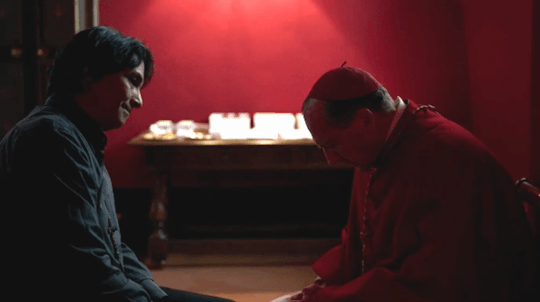
Johnlock - Sherlock Holmes/John Watson - BBC Sherlock - Look, I know this ship being so ridiculously close to canon has a lot to do with relentless and disrespectful queer baiting from the show runners, but that doesn't change the fact that this ship is solid gold, and really, ACD canon ships it too. John and Sherlock's simmering chemistry on screen made this one of the most popular fandoms in AO3 history. The way these two slowly grow to know and trust each other until they are ride or die (I don't acknowledge the show past Series 3, sorry), is addictive. Amazing ship! It still has my soul.

Bagginshield - Thorin Oakenshield/Bilbo Baggins - The Hobbit - I mean, COME ON! This ship is so close to canon it makes you wonder if Richard Armitage had an actual crush on Martin Freeman IRL. There are so so many amazingly shippy scenes of these two like... dating and preparing to get married? Idk, the Acorn Scene, the Hug Scene, the Mithril Shirt scene. The way Thorin looks at Bilbo as if he wants to eat him. The way Bilbo's entire heart is broken when Thorin dies. So much good, shippy content. Thank you for your service, Peter Jackson. I love my 9 hour Bagginshield Fanvid so much.
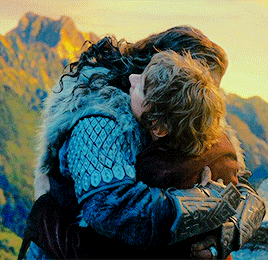
Sherlock Holmes/John Watson - Granada Holmes/The Adventures of Sherlock Holmes (Jeremy Brett Holmes) -Dare I include two Sherlock Holmes ships in one post? I think I darest! The fact that this ship was so very gay, even back in the mid 1980s - early 1990s is saying something. The way Holmes tenderly strokes Watson's face when he's coming to after literally fainting when he finds out Holmes didn't die in the Reichenbach falls. The way they are such absolute married husbands who spend all their possible time together. This ship is much softer and kinder and full of much more mutual appreciation than BBC Sherlock, simply because Granada Holmes is a less acerbic, cutting sort of character. I love them so much!
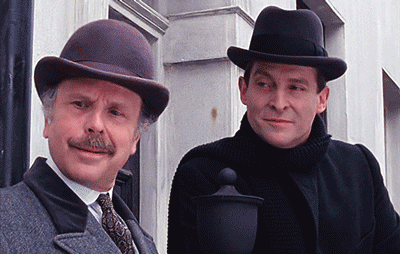
Honorable Mentions! (ships that imo, lack the near-unanimous fandom support of the above ships, or where their connection is less clearly romantic)
Goodsilna - Harry Goodsir/Silna - AMC's The Terror - Lots of folks see them as having sibling or friend energy, and it could be seen a somewhat one-sided (on Goodsir's side of course), but it's so sweet and deserves a mention.

Jopzier - Francis Crozier/Thomas Jopson - AMC's The Terror - My OTP lacks the mutual romantic chemistry that would put them on the near-perfect ship list, but they are still on FIRE. Jopzier nation to me!

Tedependent - Ted Lasso/Trent Crimm - Ted Lasso - This ship has a lot of support from James Lance, and is so, so addictive, but I'm afraid canon support is pretty low by comparison. There are some lovely shippy moments when Ted and Trent go out for spicy food. Some very nice sustained eye contact and hand holding shaking of hands, and as a bonus, Trent Crimm is probably one of the most lovable characters ever. Unfortunately, they don't have a lot of air time, and aren't put together often enough for me to see this as a perfect, near-canon ship. I still love them dearly.

#ships#shipping#the terror#the terror amc#ted lasso#bbc sherlock#granada holmes#the hobbit#conclave#conclave 2024#lawrenitez#fitzier#tedependent#goodsilna#johnlock
23 notes
·
View notes
Text
some thoughts on the Emperor and its relationship with Belynne Stelmane, specifically when the Emperor tells the player character that what it felt about Stelmane was "not love, but something unique"
I think that was the Emperor's… "totally clever and sneaky" way of being honest with the player about the nature of its relationship with her. I think it knows that it didn't feel "love" for her in the way that humans would, but that it does still very much feel that brand of attachment/obsession that most illithids seem to feel for their thralls.
I think that, to a mind flayer, to love something is akin to "owning" it. it controlled and manipulated stelmane, but in turn it was also devoted and attached to her, and thus "owned" in return. I think that mind flayers are capable of love, especially ones that are capable of independent thought (emperor, omeluum, etc), but I think that it manifests in ways that are pretty alien to what most people would consider to be "love" so when the emperor tells tav that it wasn't love, I think it was being as honest as it could be with someone that most likely could not (or would not) conceptualize what "love" looks like to a mind flayer my personal thoughts regarding the emperor and stelmane are that it desperately wanted her to be what it would eventually view tav as: an equal, someone that could be a true illithid companion to it. I think that her utility to it as one of the four dukes was far too great for it to necessarily risk pushing her beyond anything further, but I think that it sincerely would have liked for her to become a mind flayer as well
the emperor is very machiavellian in its approach to problems (the ends justify the means, and the ultimate goal must be prioritized above nearly anything else), so I think it's most likely that it would have wrung all ducal utility it could have gotten out of her before trying to find a way to turn her into an illithid. But that's just me spitballing, of course. It could very well have just viewed her as a thrall and kept her as a "pet" for the rest of her life, like most illithids do
but the emperor's humanity is exactly what makes me think that it wouldn't have, and that it would have rather loved her in a more "traditional" way
as for stelmane herself, an important question remains: how much, if at all, was she actually present during their time together? it's obvious that she fought back against the emperor (and both it and in-game documentation will tell you as much), but I think it's prudent to consider that the emperor thrives on technicalities and half truths. I think it's highly likely that , for at least some of their time together, stelmane worked WITH the emperor. I don't think it would have grown half so attached if they didn't operate well together, and I don't see any reason not to take it at its word when it assigns itself as her "partner" (though I certainly think stelmane would have disagreed with the sentiment).
their relationship fascinates me because they're both such interesting people. it's well known that baldur's gate is practically a wretched hive of sin and villainy, so I doubt stelmane's record is squeaky clean (on top of the general assholery that accompanies politics, which wyll himself attests to), but I also do not believe at all that what the emperor did to her was justified or merited. But she's interesting because, even though she is literally Doomed By The Narrative and dead on arrival, she does not ever feel like a victim, at least to me. she and the emperor are both this interesting combination of being not as bad as you'd think, but also pretty damn far from being good, and I just live for that degree of depth and complexity.
#welcome to my ted talk ig#this isn't even half of my thoughts about it all#but hey#what can you do#Ghaik Thoughts
52 notes
·
View notes
Text
Did anyone see the Paris Opera Ballet’s Swan Lake on IMAX this weekend?
youtube
Nureyev’s libretto….lots to unpack. Rothbart is such a central character in this version pulling the narrative strings in overt and dark ways both inside the court and on the mystical lake. He’s not just evil wizard who has trapped Odette, he’s a dark force within the very halls of power who seems to have everyone hoodwinked — this fully registers with me after the recent US election.
It seems the capture of Odette and turning her into a swan was some sort of long game to destroy Siegfried, who stands in the way of power. But Rothbart also seems to have some masochistic, sexual feelings for the young prince, too. The homoeroticism was off the charts — I’ve never seen the crossbow gifted to the price so seductively! One interpretation could be that this version of Swan Lake is about doomed sexual longing because it’s Siegfried who dies in the end. Odette is forever trapped as a swan, and Rothbart’s dominance is complete.
In the sequel, Rothbart marries the Queen and rules with total power because she’s lost in grief after the death of her only son. Odile is his mistress. But the Prince’s Friends with the help of the swans come to the rescue and defeat Rothbart, returning the balance of power of good over evil. You’re welcome!
Park delightfully surprised me. I had never seen her dance before beyond short clips online. She exceeded my expectations, especially as Odile. Marque is really exquisite. He’s an expressive dancer with beautiful jumps and soft landings. But Pablo Lagasa, as Rothbart, stole the show with his technical prowess and smoldering deep-set eyes.
Seeing this in IMAX is incredible. Would love more of these, please! Love the bird’s eye views of the corps….I don’t care for a lot of Nureyev’s choreographic choices, but I did love seeing the corps formations, especially in Act 3. Normally, I like the set design and costumes at the POB, but the Easter egg hues for the court scenes didn’t work for me. The fuchsia gowns for the brides with those tiny fans were downright garish.
#ballet#paris opera ballet#swan lake#rudolf nureyev#Pablo lagasa#sae eun park#Paul Marque#youtube#imax#ballet on screen
62 notes
·
View notes
Text
I'm losing my fucking mind
Or: I just saw Lord of the Rings the Musical at the Chicago Shakespeare Theater and my brain chemistry has irreversibly changed
I'm too genuinely scrambled at the moment from travel to make a solid post (I am multiple states away from Illinois and I hate city driving) but I cannot shake the life-changing experience that was.
SPOILERS AHEAD
(Spoiler free tldr: story is changed sometimes severely to make a sub-3hr runtime or to simplify, but the message doesn't get completely lost. Tolkien fan approved)
First issue I can see everyone having is how much the story changes because it does change a lot. Rohan and Gondor being merged is probably the most glaring. I think it works because the show is more focused on the Hobbits (specifically Frodo and Sam). Personally I can look past it. My one issue is the missing Sam monologues (mount doom is a rather swift sequence, I'd have liked to see Sam give his devotion speech and his speech about the shire while waiting to die) those would have made insane songs but alas. The ending still was a gut punch though so it's more a personal preference thing.
First thing that blew me away was the technical aspect. The lighting and set design was GORGEOUS and EVOCATIVE. There were multiple times lighting alone drew me to tears.
The puppetry is immaculate. The nazgul chase is singularly some of the most beautiful choreo I've seen and I'm a slut for puppetry
The cast play all of the instruments live on stage, sometimes while doing choreography (nothing will prepare you to see Legolas holding a fucking trumpet or Boromir strapped into a goddamn accordion)
The costuming is more accurate to the original editions' illustrations which I found endlessly charming. One difference is, for safety (probably OSHA), all the hobbits (and Gollum) wear Sandals. This is never discussed. I love that.
BOROMIR IS KILLED BY HIS OWN SWORD WHICH I CANNOT EXPRESS HOW PERFECT THAT IS NARRATIVELY
GOLLUM PLAYED BY TONY BOZZUTO IS NEARLY INDISTINGUISHABLE FROM ANDY SERKIS
(I am not joking about this. Somehow he has mastered Andy's physicality and voice work. It truly was a sight to behold.)
Saruman/Elrond's actor (dressed as a hobbit) was hanging out in our section during preshow and was having a grand old time.
Bilbo and Frodo were in the main audience bothering people. Frodo was playing a stick and ring game and got absolutely shown up by some 10 year old he invited to play.
The Entmoot took literally 2 minutes (the way I had to stop from HOWLING at that)
I was SOBBING at the end, like actually.
Somehow this production managed to keenly make me feel the ending of Frodo leaving for the Grey Havens more than the movies did. The Irony of Frodo leaving being both a hopeful prayer that there is a place where people bound with trauma and wounds too deep to heal can live in peace without pain and also a grim acceptance that sometimes people cannot recover was STARK
Frodo and Sam really push the narrative of this show up until the end and it hits HARD. God bless this cast with steady work, they all deserve it.
131 notes
·
View notes
Text
isn’t it wild how anya and swansea both unintentionally doomed the rest of the crew just as much as curly did
/NOT anya or swansea hate i love them im just fascinated by narrative parallels and the “so technically it’s everyone’s fault” trope
honestly i think daisuke’s fine though— oh no wait he lowkey doomed swansea and curly AND jimmy fhsjdhsjdn
too tired & busy to expand on this rn but i absolutely have evidence to back this up so ask and you shall receive
30 notes
·
View notes
Text
I rewatched it and I can't get this out of my head. My least favorite part of Sonic 3 is that they removed Maria's terminal illness. It just changes the themes of her story too much in my opinion.
The whole point of her illness is that Shadow feels a sense of responsibility over her that he otherwise wouldn't have. She is the part reason he is alive at all because Gerald needed him for a cure. Before the GUN raid, is his life's mission to be that test subject that pioneered medicine. She is his motivation because every time they do tests on him, the scientists say it's for her. Every day he was told he exists for her. Maria was much more than his friend (and while Maria was an amazing person to everyone who knew her, she was also a major motivator for research).
Another thing is that it takes out the depth of her relationship with her grandfather. In the movie, Gerald is just attached to her. In the games, he made a Faustian bargain with a demonic alien to save her. He risks his fellow scientists with making the biolizard because he is desperate. It kind of downplays how close they were to take out the fear Gerald already had of loosing his beloved granddaughter.
The other point I want to make is that the illness is what creates a "what if" for her. In an alternate timeline, we do not know if she survives. They make a lot of progress in finding a cure but it is entirely possible they never do/ find one after she dies young from her illness. Technically, she could have been doomed by the narrative even if she was never shot. Also in the games, Shadow is implied to be mostly immortal. He would still loose her even if she lives to old age. What Maria's life after the GUN raid would have been is a mystery because we do not know if they succeeded in curing her.
Overall, Maria represents potential that cannot be fulfilled. In flashbacks in the games, she is always limited because of how sick she is. She missed earth but she has to stay on the Ark or she will get worse. She can't see her family anymore because of the severity of her condition. In more recent game cannon, she has limited mobility and has chronic pain. While she is not miserable and sees positives in her life, she still wants more.
Taking out her condition takes out a large part of the tragedy of her death. While in both narratives, her potential was cut short, game Maria was already limited in her potential because she hadn't gotten a cure yet. She was stuck in space because of the severity of her illness and she died without getting to go home. In the movie, she was flattened as a character because they took out her disability.
#I liked everything else about Maria's character in the movie#everything else was fine#this is just my one complaint#sonic the hedgehog#sonic 3#sonic movie 3#sonic movie spoilers#sonic movie universe#shadow the hedgehog#maria robotnik#shark shouts <3
19 notes
·
View notes
Text
if azula needs redeeming, why wasnt she?
i read this analysis of Azuko? Zukla? idk but a critique of their sibling dynamic, particularly within the context of doomed siblings, and tho i don’t agree with it, it’s a testament to its writer that there’s innate value in carving out my thoughts from their own.
so a lot of my disagreement boils down to the fact that the way the analysis construed zuko & azula, from characterizing them as doomed siblings, to the way azula’s breakdown is framed, is a problem of taste and inferences, and how these interpretive elements can be incongruent with technical aspects like intent, convention, medium, or the functional mechanics of art overall.
firstly, i think its very important to highlight that while elite art is holistic and multifaceted, it is doubly focused and premeditated, and its constituents all occupy a purpose and position within it, as they are narrative elements first and foremost. which complicates things when creation and consumption are both such human, evocative processes, but i think looking at the rudimentary layers of a story are the north stars in subjective landscapes like this. and most salient of these, is the story’s anti-colonial roots, centering indigeneity explicitly, and the cultural, spiritual and earthly relationships therein, with the main conflict being restoring the dignity and autonomy of the subjugated, alongside the internal work and opposition that are necessitated in doing so. everything stems from that, and though there is complexity and nuance therein, and the story itself is immensely liberal in execution, it is also ultimately a good vs bad narrative, which it has every right to be, bc colonialism is bad, and colonialists are bad.
therefore, atla inherently adheres to convention, and has a preestablished idealistic framework. to illustrate this, it utilizes two central characters, both encapsulations of the dualistic nature of oppressor and the oppressed, and navigated thusly as foils to one another. zuko is thereby, the deuteragonist, and the depth or lack thereof, of his environment are equally conditioned by his position, as the confines of the kid’s tv medium, serialization as well as narrative structuring itself, craft him. kill your darlings and all that lol.
however, these positionalities, while abiding convention, are not binary, and while conclusive, they are not absolutist. zuko for example, is antithetical to a Madonna, stressed by him even having a redemption to realize, and azula too is done an injustice by any reduction to a whore / imperfect victim archetype. this compartmentalization, is luckily ill-fitting in accommodating their totality, and doesn’t incorporate the fact that consequence, in avatar, is not a condemnation of personhood, but a retaliation to action, and has mangled indiscriminately, with azula’s case actually, being the reclamation of principles and in-world intentionality.
to begin with, zuko, while most recognized for his redemption, is not functionally the redemptive character™, he’s an example of the sacrifice, sincerity and labor that are inherent to anti-colonial action facilitated by an absconding oppressor, of the inborn empathy and active resistance that are needed for a system to change, and how you don’t just get there through platitudes or amicability. those thematic niceties are ofc inherent to his story bc he’s fleshed out and the things that inspired him thusly are too, but that emotional and relational floweriness is a consequence of his actions, not their driving force (being embraced by imperial idolization, by his royal family, was not fulfilling), what drove him is a fundamental and intrinsic ideological disdain for the imperialist war machine — it was ultimately, an abstraction of self – by acting in service of others, which unlike letting imperialist standards (e.g. chauvinism and parasitism and “honor”) puppeteer him as an instrument of violence, is ironically, an act of true autonomy and discernment. deriving your value from mutualism and earning one’s stature, instead of asserting yourself on others and letting corrosive and paternalistic worldviews (and by extension the selfishness & self absorption i.e “honor” innate to that) rule your destiny.
azula, however, is meant to be an inversion of that, is meant to reflect what happens when you reject morality or connection, instead letting control and superiority entrap you. she is explicitly a cautionary tale, which also comes with its own oversights and inelegant implications, but she likewise, greatly exemplifies the internal decay and loneliness inherent to alienating yourself through cruelty and stratification. and is it not possible then that a girl who has valued herself by what she can inflict on others, would then have the very sanctity of existence warped at no longer being able to dominate, no longer deemed the ideal? is infection not a thing that savages, before it spreads? in this way, azula is poignant.
as the more intimate face of imperialism, she is humanized in her parasitism, but it is not used to soften her behavior, nor is it used to hand her redemption. it is not smth that she is owed for the very coincidence of her birth or blood, its earned, and she did not earn nor want it.
so when a character that suggested the utter evisceration of marginalized groups, and thereafter tried to murder a personification of colonial survivor’s guilt and endangered practices, is consequently left to mourn her superiority, just as her father before her, its smth we sympathize with within reasonable boundaries. when her brother, who she abused, doesn’t martyr himself to azula’s interiority, instead laboring towards his own destiny and happiness, rather than the genesis of azula’s redemption, that is not inconsistency, it’s peace. its making peace despite the fact that some would rather rot in the entrails of imperialism than afford its victims value, would rather hurt others, and in turn themselves, than embrace healing and progress
— (plus inflicting his values may not in fact heal, when healing is not inherently uniform, and growing is not innately moralistic).
now, there’s a whole nurture vs nature angle to this as well and these ontological arguments are often touchy, yes zuko had ursa and iroh. yes zuko was forced to challenge his preconceptions, but zuko wasn’t diametric to these things, and the supplementations he did receive were always compensatory. zuko was deemed genetically inferior by ozai and thusly ostracized, hence ursa’s gentle partiality, zuko was then mutilated and exiled, and naturally needed supervision, which was provided by an overseer who mirrored his disgrace. if denied these safeguards zuko would’ve been denied even palliative care, whereas azula was perceived as needing none when she was revered positionally and familialy.
yes being pit against zuko was toxic and destructive but its not at all equivocal to the outright abuse zuko suffered. ofc the threat of it was implicit but those who abet or orbit abusers are not inherently under threat, and i think azula is characterized similarly. it's not fear that colors her outburst against ozai, nor coerces her silence, its entitlement and a sanctifying of hierarchies: “i deserve to be by your side.” - it’s respect that earns her silence and it’s the promise of respect that goads her acquiescence, the prospect of accumulation. this is ofc not a healthy mindset to have bc azula hinges her value on perfection, performance and status, and it's evident how the pressure of that collapsed her, but it was a pressure she had embraced before. it was her adeptness that ozai latched onto, and before the inviolability of it was challenged, azula took advantage of her nature, she weaponized it, and it was that eagerness that ozai exploited.
as viewers we process this as the objectification it is, but its reality, is a systemic natured dehumanization, ingrained in any culture that seeks to mechanize its constituents (which is all societies actually. we are all complicit). ozai thinks he is honing her as did his father and his colonialist forefathers prior, and herein is not abuse in the conventional sense, but rather a tradition of commodification that extricates skill and hegemonizes personhood, it’s an existential death necessitated by imperialism. it’s the death of agency. azula embraced this necrotic philosophy until she was confronted with the consequences of her rot, and *that’s* what she got. consequences. of which she was spared throughout.
it was never personal.
sure we get glimpses of her humanity, her vulnerability, but they’re paltry and muddied too by an undercurrent of duplicitousness. azula flaunts zuko’s impending demise, yet later, includes him in her outings. azula relishes zuko’s mutilation, but also fetches him from the beach house. she falsely welcomes zuko back, then implores he join her sincerely. and azula shares her pain from ursa yet spurns softness still, from MaiKo’s juvenile fondness to ursa’s own guiding attempts. azula is ceaselessly cruel to zuko, then spontaneously benevolent to him once he has seemingly subsumed the apparatus of colonialism. and gives him credit for killing the avatar, yet shows a sly inclination of his revival. this isn’t to insinuate that azula is ontologically evil or that she’s an unnuanced, mono-faceted individual. and she was a child. yet zuko’s youth didn’t spare him from the grotesque terrors of death and alienation, and it didn’t temper her perpetual antagonism and bloodlust, she is demonstrably self-serving, and this is evidenced throughout.
this is not to shame her in her passivity, nor an expectation that she martyr herself or even commiserate with her brother. rather, her downfall is a reaping of autonomy, made subject to the tendency of one’s active leanings. in which the choice of her sibling abuse exacerbated her societal abuse, all festering, foremost, the abuse of her own soul.
so, relatedly, is it not possible that a character of her cunning, who emotionally degraded her own sibling while gleefully championing his attempted imprisonment, before graduating to attempted murder by preparing to electrocute him while he was enfeebled on the ship, then later tried to kill aang, tried to kill katara, gloated abt intending to kill zuko at the air temple, injured iroh while making her escape from the gaang + zuko. also endangered and coerced ty lee into joining her, imprisoned mai, nearly killed zuko as he tried to save katara (which was likely her intent, or at least meant to cripple zuko’s composure — dishonoring the agni kai) — need i go on. azula’s benevolence is conditional, and consistently transactional, and so is it not possible then that she gauged zuko’s swaying allegiances against her own armaments - when faced with iroh, a waterbending master, an earthbending master with groundbreaking abilities (>_-), and the literal avatar, after observing their – plus aang’s growth, and having been cornered before, then decided rather, that having another asset, puppet, contingency plan, in her pocket wouldn’t hurt.
maybe she was being benevolent, or maybe, azula, who too sat in liberated territory and was gifted a chance for growth and morality, rejected that chance over the value therein, tenderized for extraction, parasitizing instead. maybe azula too, was acting in the imperialist tradition of exploitation. maybe she holds the capacity for compassion and care — which we have gleaned regardless — but the tangentials and hypotheticals of the world are often not what is actualized, and they are not a thing that can be affected. empathy is an active pursuit, and it is mutualistic, provisional — and so there is not a ‘who’ of azula’s redemption, but a what, the ‘what’ that is to be influenced. the personalization of one’s own form, of an internal receptiveness to commiserate with. bc as is, azula is merely a husk of colonialism, and being a husk of colonialism is meant to be sad, its deliberately tragic, unflinchingly pitiable. disorienting. life shattering. that’s what you’re meant to feel, it is not an inadvertence of zuko’s arc, and it is not a coincidence of the narrative.
she is a trajectory within herself, and her fate is a whole within itself. just as zuko labors towards rectifying his nation bc he needs to, bc there is value in dismantling colonialism, not bc the imperialists are owed it, but bc everyone else is. zuko also watches, not with apathy or boredom as his sister implodes at this, but with pity, with grief, bc azula manipulated herself a bed of corpses, and it is not him who must choose not to lie in it. when healing is intentional, is active, and zuko has chosen to heal. when azula cannot be handheld and shielded from her war crimes and systemic violence bc she wasn’t hugged enough as a child. zuko too lost a core sense of support mournfully young, and moreover at many points in his development journey, but the inclination that told him to speak up in the war room is doubly the same inclination that told him to afford jin affection, or help the earth kingdom family, and save his crew member in the storm, despite this very vulnerability catalyzing his banishment.
azula had friends and she had adoration and she had paternalistic validation, but contentment is unattainable when accumulation is your driving force. and the only thing left to cannibalize is yourself. with this, azula’s downfall was not only inevitable, it was natural, foretold even. and just as iroh doesn’t adhere to whatever deficits were sewn unwittingly into ozai, nor is it demanded — it also isn’t azula’s fallibilities that now damn her. azula isn’t the “bad sibling”, devoid of nuance, she’s the bad person™. despite it all.
katara has ptsd and toph is blind, sokka is a non-bender and zuko was deemed handicapped then maimed thereafter, instability is not azula’s punishment, its an externalization of her decay, and its meant to be unrelenting and all-encompassing, because abstraction and objectification are totalitarian afflictions. likewise, her condemnation is not a consequence of gender marginalization, tho the undertones of spoilt brat tropes and somehow unconventional, inevitably crazed women sully our palates. we taste bias even where it perishes, even as the fire nation is seemingly meritocratic, and unabashed, imperfect girls are idealized story-wide. from toph to azula herself, who may be conflated for a sanist archetype, yet challenges gender roles and infantilization in her prowess and militancy, as she’s sterile and calculating and impassive, where zuko is feeble and undermined, aimless, emotional. she is far beyond any trope, contrivance or embellishment, and doesn’t flourish or encumber zuko’s arc, as he equally isn’t made to for her’s.
azula is a force beyond zuko, until she can no longer deny him, and azula haunts zuko until she doesn’t, until her own crossroads loom, her contrived dualism of failure or victor, aggressor and victim. and she is forced then to reckon with loss. azula’s end is not a reductionism at hands other than her own, her fall is not zuko’s win, nor does the show frame it gloriously, there is no joy in her misery, no minimization of her tragedy, from the score to the tone, in her chilling, animalistic pules, azula languishes in her self-destruction, and it is one entirely independent of zuko. with this, we are shown azula’s nuance, the unthinking allyship she inspired, yet the coercion and dereliction it veiled. the camaraderie and kindness she offered, to warn zuko against visiting iroh, to credit him unduly, yet the threat it masked, to stay unadulterated, to stay unctuous. the vilification she detested, and yet the love she scorned for its fragility and irrepressibility. ursa doesn’t confirm azula’s worst fears, ironically, sadistically, any love she may have held haunts her, is nearly derisory. impossible.
and while no debate exists that ursa neglected azula, or that she failed her duty to nurture and cater her parenting to azula’s needs and interiority, the factors that complicated that, such as ozai’s own domineering hold, alienated mother and child from any means of cultivating real love, and thusly the influences azula did ingest were brutality, unchallenged in nature, entirely singular. it’s a self-flagellation, a ritualistic and sustained self alienation, amputating any vulnerability, all perceived pluralities.
so azula, despite not consistently having her perspective expressed, still encompasses the products of colonial rearing, and its destructiveness isn’t meant to be contested, sugarcoated, not with others and not with the self. fascism has denied us azula the person, and that may be a consequence of format, but it isn’t a consequence of the narrative. nor realism. we are meant to acknowledge azula’s complexities in the intentionality of their artful crafting, while not undermining that architects of oppression still bleed. one can see themselves in azula’s struggles, in the humanity of her endeavors, while not decontextualizing the tenets of her positionality, while not undermining that every character that claimed their redemption, did so by choosing another, by loving.
and azula’s journey to love, to embracing her own humanity, is a journey solely her own. this isn’t to say that she doesn’t deserve support or guidance or love or care, but that’s not the point. that wasn’t the intent of her character, and that wasn’t the thematic priority of the show. it's an extrapolation. bc some ppl suck and that’s ok. and there are ppl you cannot help and that is ok. and sometimes the ppl you love will suffer, and that has to be ok. bc sometimes you choose yourself, sometimes you choose what you can, and that is ok. it is okay to grow, and it is ok to move on. that’s the point. it is ok to spit out the poison. forgive any tactlessness therein, but it’s a tough pill, and its meant to have an aftertaste.
however, it's not cynicism that one is meant to internalize, and it's not intended to inspire fatalism either, although the symbology of azula’s toxicity is excised, the human struggles she encapsulated remain, the intimacy of our empathy persists, and it will color the fire nation’s vices and pitfalls. bc when one can’t just will away indoctrination, as we saw with both azula and zuko, and even still with paku or toph’s parents, as hierarchies are intersectional and multifaceted, and in the trials of decolonization there will thusly be azulas’, but there will also be zukos’, and pakus’, and sokkas’. all with their very intimate, equally human complexes to confront, unravel and rectify. just as there sit your perspectives, as there too exist my own influences.
and while zuko may merely be a beneficiary of the prevailing zeitgeist (tho imperialism explicitly requires non-consent lol), where azula once functioned, and he may be no more ontologically owed redemption than azula, or deserving love over her, when in the forever-war of subjugation, it isn’t abt ontology or criteria, nor logicisms or hypotheticals, its abt action. so zuko tries. and that resistance, that anti-colonial praxis, is a good start, it’s the most meaningful start. zuko isn’t king, or redeemed, bc he’s genetically “good”, its bc he tries. that’s the point. not how efficient he is or how proficiently he embodies apparatus.
reparation. that’s. the point. the triumph of resistance juxtaposing the tragedy of complacency. bc nothing is immutable, and so nothing is too far gone.
.
.
Besides… it’s only a kid’s show heh.
#zuko & azula#indigeneity#imperialism#writing tropes#atla meta#commodification#azulko aren’t doomed siblings. bc the doom didn’t have to be inevitable — and it was never beyond them#azula can still change. bc azula is not evil#but that’s not the point. bc azula chose not to#prince zuko#narrative analysis#princess azula#and that matters. that has intent & that has reason — and what we may *want*. what she may want — may be optimal. is immaterial.#the gaang#marginalization#doomed siblings#atla azula#fire nation#azula avatar#atla#zuko#avatar the last airbender#atla zuko#tv tropes#totalitarianism#original post
31 notes
·
View notes
Note
why do you ship poppy and sparrow from eah?thoughts on duchess swan and sparrow?
I have nothing against shipping Duchess and Sparrow! I just slightly prefer to think of them as best friends. Honestly, considering how she’s lived in the shadow of tragic doomed romance her whole life, I think it would be really nice for Duchess to find her happiness without any long-term romantic partner. I feel like she’d have anxiety about romance ending badly for her. Yeah, it turns out destiny is fake, but fifteen or so years of having the inevitable narrative of your future drilled into you and knowing that you are meant, you exist, to be hurt and betrayed and doomed by your romantic partner? That’s gonna mess your attitude to dating up. And since destiny is fake, non-doomed lovers are just one bad day away doom. There is no permanent happily ever after. Anyone could hurt her for any reason; and as she hopefully matures to be nicer and more moral, she could be afraid of hurting her lover too based on her past actions. But to learn that she doesn’t need to be anyone’s love interest could be empowering and liberating. She and Sparrow are definitely each other’s true loves in some way. I personally enjoy the platonic sense better, but the romantic option is just as valid an interpretation.
Okay. Duchess tangent over. Now, as for what I like about Poppy/Sparrow.
Poppy says in her bio that she finds Sparrow cute, but would like him more if he weren’t so arrogant. That’s a good foundation on her part. She sees worth in him, but also his flaws. If he ever wanted to play around with her, her standards and boundaries (and Holly) would force him to get his act together at least a little, which could be a catalyst for his character development.
They both have themes of freedom and rebellion. Sparrow is a Rebel more because he values his personal freedom than because he’s invested in human rights, refusing to conform to the law by stealing, his story by keeping the gains for himself and social norms by being an ass. Poppy loves not having a predetermined future and officially becomes a Rebel to avoid being the next Rapunzel and queen. Her least favourite class is Princessology, where you learn to be a responsible, respectable princess. Sparrow gets that. But she can show him how to express himself and defy social mores without being obnoxious about it.
They’re both creative types with unconventional styles and adventurous spirits, Poppy’s medium being hair and fashion while Sparrow’s is music. However, Poppy is a great, popular hairdresser. She’s good at listening to her clients’ input and giving them what they want, without sacrificing her own integrity. Sparrow is technically a skilled guitarist, but he hasn’t bothered to become as good a singer, only cares about what he wants and is terrible at responding to criticism. He could learn from her to be a better artist. And I think their alternative aesthetics (I know Poppy’s is still pretty tame and feminine, but that feels more like Mattel being Mattel than the ultimate expression of her alleged personality; fanart that depicts Poppy with a wilder fashion sense my beloved) could complement each other really well.
Conversely, Poppy has sometimes been known to be unsure of new situations or herself, like that whole time she was on the fence between the Royal and Rebel ideologies or when she was nervous about ice-skating for the first time. It’s easy to extrapolate that being raised as the spare to Holly’s heir with the glaring lack of a destiny could have given her some identity issues in general. (Canon doesn’t really show that, but canon shows us so little depth that we have to fill in the blanks.) Sparrow does not have that problem. Ever. He knows who is and what he wants in life, and he’s gonna take it. Maybe he could influence her to be more confident.
It’s less much less obvious because Poppy is genuinely kind and morally principled and socially competent to balance it out, but she has a selfish streak too. She regularly cuts off her magically strong, long and fast-growing hair and sells it. Why sell it? Why not just donate it? Because despite having all the money she could ever need, she wants a little more for herself. She makes a steady profit by selling something she doesn’t have to work for and doesn’t want. That’s a shrewdness and initiative Sparrow can appreciate. I think her choosing centrism wasn’t as callous or stupid as some fans have made out; the Royals have a lot of understandable, sympathetic arguments, the Rebels at this time can’t prove that the other shoe won’t drop and with a Royal sister who’s probably afraid of her going poof, it would realistically be an emotionally fraught political debate for a teenager. But her “Roybel” identity is still a safe position where she tries to have the best of both worlds and can feel vindicated no matter which side wins. And it’s interesting that for as good a person she is and as many friends she has with Rebel stances and/or tragic fates, what drives her from “The face-eating leopards have pros and cons, let’s see how things go” to “Face-eating leopards are bad and need to be fought” is literally “Wait, the leopards want to eat my face?” If anything, I think her selfishness is wiser and more effective than Sparrow’s - she stays inside the law and benefits others enough to have strong friendships and a glowing reputation.
We also see in the ice-skating webisode that Duchess develops respect for Poppy and her courage after initially viewing her as a rival, setting up a friendship and a fun dynamic as Sparrow’s two true loves. Especially if, as I suspect, Poppy wouldn’t make a half-bad partner in crime herself. And on the other hand… Sparrow and Holly. Sweet, gentle, polite Holly who finds nothing more exciting than reading. And Sparrow Hood. Needing to coexist and learn to get along. That’s hilarious. Imagine the wedding speeches.
In the original Rapunzel tale, she was born to poor farmers and married into royalty, so an O’Hair falling for a commoner is at once a reversal and a return to form. It feels fitting.
Likewise, the original Robin Hood was in some versions a nobleman who abandoned his decadent lifestyle to serve the lower classes. (They weren’t always comfortable having a true peasant hero.) So I like the idea of Sparrow inverting that with his journey, being a greedy, selfish scoundrel as a poor kid and then only gaining riches after becoming equally rich in compassion and generosity. Only once he’s ready to share the wealth does he get access to a royal treasury. Legally, even!
Thanks for the ask! It was very fun articulating my thoughts and feelings about these characters, I’d never done that before and I thought of a few new arguments while I was writing this. I love all of them even more now.
23 notes
·
View notes
Text
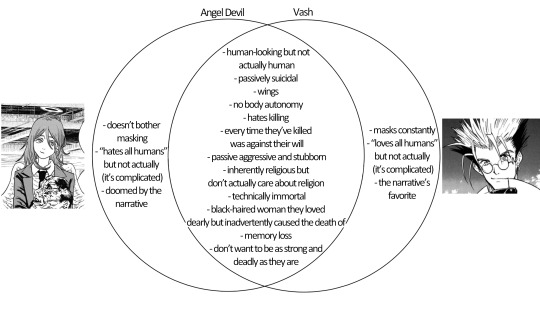
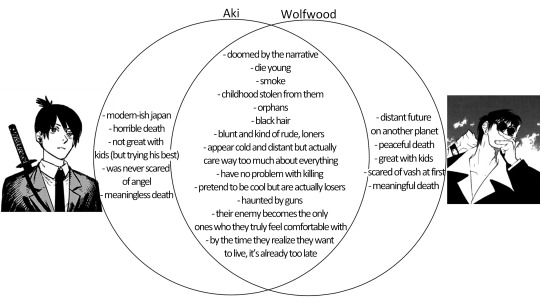
my thesis
text if it's hard to read and some explanations under the cut:
vash & angel devil:
human-looking but not actually human
passively suicidal
wings
no body autonomy: forced to do things by humans and other devils/plants
hates killing
every time they’ve killed was against their will: angel devil has never gone out of his way to kill a human. vash intentionally kills only one person in the entire manga and he fucking hated it
passive aggressive and stubborn
inherently religious but don’t actually care about religion: they're both angels but they never show any interest or knowledge of religion (and actively show disdain for it at times)
technically immortal
black-haired women they loved dearly but inadvertently caused the deaths of
memory loss
don’t want to be as strong and deadly as they are
angel:
doesn’t bother masking
“hates all humans” but not actually (it’s complicated)
doomed by the narrative
vash:
masks constantly
“loves all humans” but not actually (it’s complicated)
the narrative’s favorite
wolfwood & aki:
doomed by the narrative
die young
smoke
childhood stolen from them: forced to grow up too fast
orphans
appear cold and distant but actually care way too much about everything
black hair
have no problem with killing (until they meet someone who changes their morals)
pretend to be cool but are actually losers
haunted by guns
blunt and rude, loners
their enemy(ies) become the only ones who they truly feel comfortable with: vash for wolfwood; denji, power, and angel for aki
by the time they realize they want to live, it’s already too late
aki:
modern-ish day japan: chainsaw man part 1 takes place during like the mid-90s, i'm not sure if that constitutes as "modern" anymore
horrible death: become the thing you once feared
not great with kids (but trying his best)
was never scared of angel
meaningless death: this does NOT mean his death shouldn't have happened!!! "meaningless" in the narrative sense; everything he did and worked towards was for nothing
wolfwood:
distant future on another planet
peaceful death
great with kids
scared of vash at first, but overtime came to trust him more than anyone else
meaningful death: he finished what he set out to do, which was always to save the orphanage. and he achieved this with vash's help (he knew vash would do anything he could to help after he died)
vashwood & akiangel:
doomed
change each other for the better
human x angel
narrative foils
#GOD I HOPE THIS MAKES SENSE i feel like this is really disjointed#but if anyone is interested in more organized thoughts/analysis let me know!!#trigun#trimax#chainsaw man#vashwood#akiangel#trigun spoilers#chainsaw man spoilers#meta#mine#talking
209 notes
·
View notes